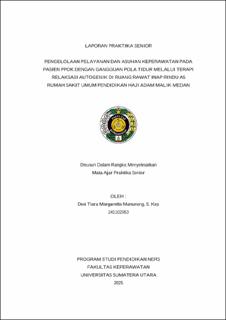| dc.description.abstract | Chronic Obstructive Pulmonary Disease (COPD) is a chronic respiratory disease characterized by progressive and irreversible airflow obstruction, especially during expiration, as a result of chronic inflammatory responses to exposure to toxic particles or gases. This report aims to apply the nursing care concept to a patient with COPD. The report is conducted using a case study method through the nursing process approach, which includes: assessment, data analysis, planning, implementation, and evaluation. Based on data analysis, three priority nursing diagnoses were identified in Mr. M: ineffective airway clearance related to mucus hypersecretion in the airways, disturbed sleep pattern related to lack of sleep control, and activity intolerance related to an imbalance between oxygen supply and demand, as well as fatigue. Following the nursing care provided, the problem of ineffective airway clearance was found to be unresolved, as evidenced by the presence of adventitious breath sounds (rhonchi and wheezing), shallow breathing, and prolonged expiration. The issue of disturbed sleep pattern was resolved, with improved sleep quality reported. However, activity intolerance remained unresolved due to the patient's persistent shortness of breath, making it difficult to perform activities of daily living (ADLs) independently. The main management approach for this COPD case focused on the provision of non-pharmacological therapy, specifically autogenic relaxation therapy, aimed at addressing the patient's sleep disturbances. | en_US |


